Debbie Young's Blog, page 16
November 9, 2021
What I Did at Stroud Book Festival 2021
Stroud Book Festival describes itself as “a celebration of stories, ideas and community for readers of all ages”, and for six years has been bringing a flurry of events over four days to a variety of pleasant venues at this busy and diverse Cotswold market town.
Although by chance I was away on a writing retreat at the start of it, I caught up with the Festival on Sunday, chairing the Made in Stroud: Historical Novelists panel in the afternoon, and in the evening attending the Stroud Short Stories event of which this time I was co-judge alongside organiser John Holland.
Three Novelists Inspired by Mid-Century HistoryI was delighted to have been invited to interview three Stroud authors about their latest historical novels in the delightful setting of Lansdown Hall, laid out café-style with delicious cake generously provided by the local Waitrose. These novels are:
Beneath a Starless Sky by Tessa Harris(German Jewish girl flees to Hollywood and becomes Fred Astaire’s dancing partner before being recruited by the British as a spy)The Girl Behind the Wall by Mandy Robotham
(identical twins in their twenties are separated by the overnight appearance of the Berlin Wall)The Schoolteacher of St Michel by Sarah Steele
(schoolteacher smuggles Jewish children across the border between Nazi-occupied Vichy France and free France).
(The authors are pictured in that order from left to right in the photo at the top of this column, and I’m in the hot seat on the far right.)

My brief was to ask chiefly about research. It was fascinating to hear where they’d found their jumping-off point for their novels, from newspaper articles (one of my favourite sources of story ideas) to chance conversations with residents of those areas.
I was also intrigued as to why they took different approaches to writing about real people – Tessa puts words into the mouths of Hitler, Eva Braun, Edward VIII, Wallis Simpson, and Fred Astaire, while in Mandy and Sarah’s books, key figures of the age are kept at a distance, for example we hear the Berlin crowd’s reaction to Kennedy’s iconic “Ich bin ein Berliner” address, but do not encounter him in person.
To write my books – contemporary village mysteries, set in worlds I know very well – I need to do very little research, and I am always in awe of historical novelists who must (a) carry out enough research to write convincingly about their chosen era and (b) how they manage to tear themselves away to write their books, rather than losing themselves down potential rabbit holes. Covid has introduced a new challenge: to find all you need online when travel restrictions preclude in-person visits to places key to the story. Each of the three authors had different favourite sources: Youtube for Mandy, Pinterest for Sarah and biographies for Tessa.
When so many fiction and non-fiction books have already been written about your era, I asked them, how did you manage to make your topic your own? What differentiates your books from others? Although their books are very different, they each had the same answer: by holding a microscope up to individuals involved.
Stroud Short Stories Go WildTheir protagonists Lili Sternberg (“the girl who danced with Fred Astaire”), Berliner twins Karin and Jutta, and French schoolteacher Lucie Laval are all strong, exceptional women with important lessons about survival and resilience amidst enforced separation and deprivation that resonate strongly to readers living through the current pandemic, and I highly recommend all three novels.
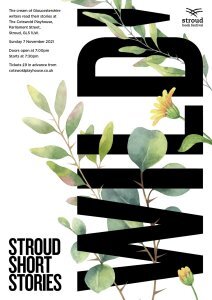 After that event I just had time for tea and cake in the Green Room before heading up the hill to The Cotswold Playhouse to greet the ten authors whose short stories had been chosen by co-judges John Holland and me to be read at this twice-yearly event. As all the stories are judged “blind”, ie the judges have no idea who wrote which story until they have chosen the final ten from among dozens submitted, it is always a joy to put the face and the name to the story. A full house in this delightful provincial theatre lapped up the ten very different stories, all on the given theme of “Wild”.
After that event I just had time for tea and cake in the Green Room before heading up the hill to The Cotswold Playhouse to greet the ten authors whose short stories had been chosen by co-judges John Holland and me to be read at this twice-yearly event. As all the stories are judged “blind”, ie the judges have no idea who wrote which story until they have chosen the final ten from among dozens submitted, it is always a joy to put the face and the name to the story. A full house in this delightful provincial theatre lapped up the ten very different stories, all on the given theme of “Wild”.
With John a slick, original and funny compere, the ten authors performed their stories to a rapt audience, from seasoned participants of previous SSSs, to those who had never before shared their work in public. They were, in the running order of the night:
Pauline Masurel with Fledglings
Claire Jaggard with The Wild Woman
Ali Bacon with The Pig and I
Jasmin Izagaren with Jumping Season
Melanie White with City Girl
Nick Adams with Demolition
Georgia Boon with Johnny Maunder Came to the Well
Hannah Glickstein with Wild Serenade
Rebecca Klassen with Clothed in Sacrifice
Robin Booth with Painted Ladies
Even though I had read and re-read each of the stories as part of the judging process, as is always the way, hearing them read aloud by their authors added to the experience, and I heard more nuances and subtleties and rhythm in the writing than before. All ten authors read brilliantly.
Until Next Time!When John announced that the next Stroud Short Stories event will take place on 8th May 2022, I’m sure everyone present will have made a mental note for their next year’s diary. My only fear is that the stories were of such a high standard that some writers may be deterred from submitting. Please don’t be: Stroud Short Stories is renowned for showcasing brand-new writers as well as old hands, and with no entry fee, you have nothing to lose by giving it a go. Keep an eye on the SSS webiste, www.stroudshortstories.blogspot.com and follow its always entertaining Twitter feed @StroudStories so that you don’t miss out.
Huge congratulations to Artistic Director Caroline Sanderson and her tireless team for staging such an inspiring series of events and restoring a feeling of post-lockdown normality to the remarkable town of Stroud. I’m sure everyone who took part is looking forward to next year’s Stroud Book Festival already!
Coming Soon! (27th November)Meanwhile I’m busy getting ready for my next public event – the first in a new HULF Talk series, a spin-off from my annual Hawkesbury Upton Literature Festival, bringing together four local authors talking about travel and adventure, from filming whales for The Blue Planet to hunting for yetis in the Himalayas! Admission is by advance ticket only, to enable us to keep Covid-safe, and you can find out more and order your ticket via Eventbrite here.
October 27, 2021
Travels with my Book #10: With Jean Gill to Wales
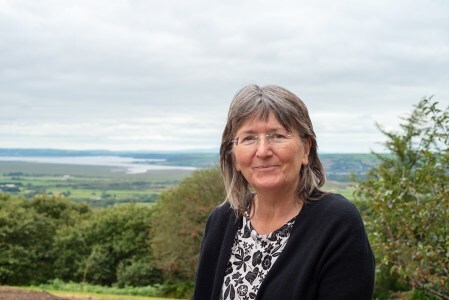 Jean in her native Wales with Mynydd in the background (Photo by Lesley Walters)
Jean in her native Wales with Mynydd in the background (Photo by Lesley Walters)I’m delighted to welcome my prolific and versatile author friend, Jean Gill. Although she now lives in France, Jean is going to whisk us off to her adopted homeland of Wales.
Jean, living within sight of Wales myself, visibly on a clear day from my part of the Cotswolds, I know exactly where it is, but please tell us a little more about it as a setting for some of your books.
In 1154, the medieval Welsh kingdom of Deheubarth was reduced by the Normans to a tiny part of what is now Carmarthenshire. Then Rhys Gryffydd, came to power and began the fight to reclaim his grandfather’s realm. Think ‘Uhtred, son of Uhtred’ in Bernard Cornwell’s The Last Kingdom and you’ll have some understanding of Lord Rhys.
Which of your many books have you set there?
Song Hereafter is the last book in The Troubadours Quartet – ‘like Game of Thrones with real history’.
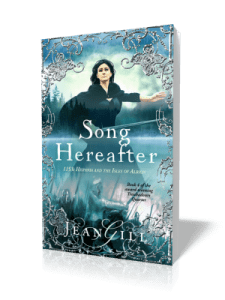 My fictional French troubadour characters travel through twelfth century France, northern Spain and the Holy Land. I had no idea when their adventures began in Narbonne that they would end up in my homeland, Wales. Perhaps it was inevitable as I still love Wales, even after twenty years living in France and time and again I am drawn to both countries as settings.
My fictional French troubadour characters travel through twelfth century France, northern Spain and the Holy Land. I had no idea when their adventures began in Narbonne that they would end up in my homeland, Wales. Perhaps it was inevitable as I still love Wales, even after twenty years living in France and time and again I am drawn to both countries as settings.
I’ve published twenty-five books now, since my first poetry book in 1988, and eight of them are set all or partly in south Wales. The Love Heals duo, second chance love stories in a rural setting, are set in both Wales and France.
When I lived in Wales I wrote about France and now I live in France, I write about both countries.
What makes Wales such a great setting for your stories?
1154 was an exciting year in both Welsh and English history, and my troubadours, Dragonetz and Estela, are caught up in the intrigues of Eleanor of Aquitaine as her husband, Henri of Anjou, manoeuvres to become King of England. Who will the Welsh support?
To find out, the troubadours seek out the rulers of south Wales. They find a land and people of savage beauty and pagan customs, engaging in guerrilla warfare against the Norman barons.
What challenges do your characters face dealing with the local people?
Even in medieval times, Welsh sophistication in verse and song has much to teach the French troubadours. Dragonetz is an ex-crusader, accustomed to battle, but he has never seen archers as skilled as the southern Welshmen – nor armed bands as undisciplined.
The contrast between ‘civilised’ southern and ‘barbaric’ northern Europe creates the conflict at the heart of the story and was a dramatic way for me to show dangerous misunderstandings.
Estela had gained a reputation as a troubadour, graced the courts of queens, been rewarded for her performances with wealth and respect. As a woman in a Welsh military camp, she is once again a nobody, protected only by Dragonetz’ status.
Modern Wales is still mostly rural and the wild landscape hasn’t changed, with prehistoric stone circles, lethal marshes, sandy beaches and mud estuaries. And of course castles, stone reminders of tensions with neighbouring England that have still exist today. I love this land as an insider and even the ugliest industrial town in which I’ve ever worked, Port Talbot, has character, and features in my books (the Looking for Normal teen books).
What is your relationship with Wales and how much of your life have you spent there?
I moved to Wales when I was 22 and lived there for twenty-five years. I had a nomadic childhood so that was the longest I lived anywhere. So I adopted Wales as my home country.
You mentioned Welsh castles. Do you have a favourite?
I love them all! When I bred Birman cats, my prefix was ‘Drwslywyn’ so all my cats began with the name of a Welsh castle, also the name of my first house.
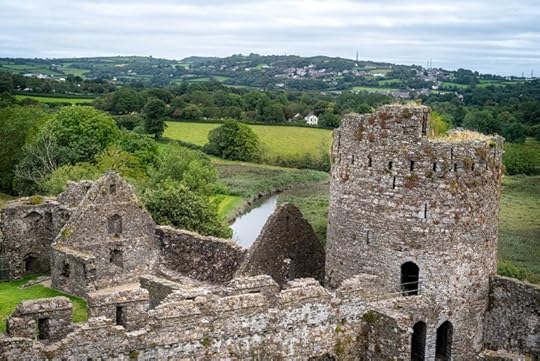 Kidwelly Castle (PhotoL Jean Gill)
Kidwelly Castle (PhotoL Jean Gill)The ones that feature in Song Hereafter are Llansteffan, Carmarthen, Tenby and Kidwelly. I’ve just revisited Kidwelly, one of my special places. Lord Rhys’ mother was Gwenllian, the Warrior Princess (isn’t THAT a title and a half!). Rhys’ father had taken Kidwelly castle and Gwenllian was defending it while her husband was in North Wales when news came of an attack by the Norman, Maurice de Londres. She led her army to meet him, was betrayed, defeated and beheaded on the battlefield – unheard of as a punishment for any woman, let alone one nobly born. Rhys was only about four at the time, so he grew up with his mother’s legend to live up to. You’ll still see mention of Gwenllian all around Kidwelly and of course her ghost haunts the castle.
Rhys’ ambition was to build his own castle, better than the Norman castles built by the marcher barons along the southern Welsh coast to keep natives like Rhys in order. I love the fact that he did it! He built Dinefwr Castle, near Llandeilo, in the late twelfth century, later than my story is set or I would be in residence permanently.
What are your top tips for any readers planning to travel to Wales?
Take every waterproof item you possess, definitely an umbrella and plenty of rainy-day books to read. Then you can be sure of unbroken sunshine and the impression that nowhere is more beautiful than Wales. Which is true. If it’s not pouring with rain.
Are there any other authors’ books set in Wales that you’d like to recommend?
Mary Stewart’s Merlin trilogy; Susan Cooper The Dark is Rising series; Lloyd Alexander Black Cauldron series.
Wales is the perfect setting for fantasy!
Two recent crime novels come to mind as well: Clare Mackintosh I Let You Go and JJ Marsh Raw Material. And for contemporary rural family drama, Jan Ruth’s novels have a vivid sense of place and lifestyle.
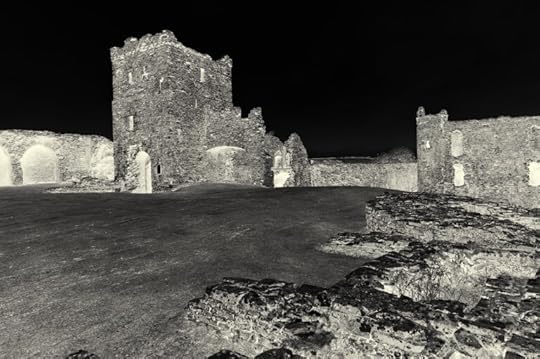 Llansteffan Castle (Photo: Jean Gill)
Llansteffan Castle (Photo: Jean Gill)Where is your latest book set?
I’ve just finished a fantasy trilogy, Natural Forces, set in the sterile Citadel and the vibrant Forest. The settings symbolise the growing gulf between humans and ‘nature’, as if we can go to war with nature and not destroy ourselves.
Where will your next book be set?
I’m back in the twelfth century, in Viking Orkney, and enjoying every minute of the research and the writing. Did you know that Vikings of this period thought that trading travel and experience of other cultures broadened the mind and was an educational experience for young men? Not all pillage! The new series will be called The Midwinter Dragon.
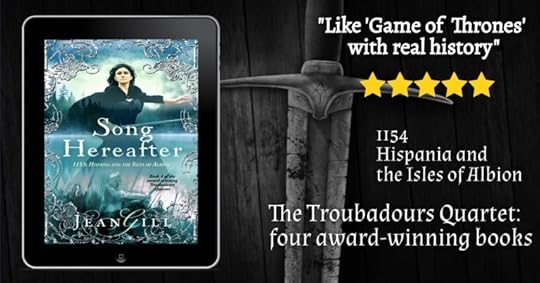
EXTRACT FROM
Song Hereafter: 1154 in Hispania and the Isles of Albion
‘Perfect,’ she said. ‘There’s nothing like being out at night in the pitch-black on the sort of river men drown in by daylight, with a man so jealous of you he’d let a tree accidentally knock you unconscious.’
That was exactly what Dragonetz was looking forward to – a challenge that could win hearts without sacking a castle, where the only risk was to himself. That, and the sheer enjoyment of learning something new in the company of young men as desperate for action as he was.
‘They’re placing high bets on the outcome. We’re the longest odds,’ he told her with satisfaction. Trying to sound responsible, he added, ‘The men need an outlet for their high spirits, after campaigning hard.’
She wasn’t fooled. ‘As do you,’ she said. ‘Well, if the odds are stacked against you, then you’d better win.’
He felt the rush of excitement coursing through him. ‘I intend to,’ he said.
Her lips tightened in a way that suggested the wise traveller’s disapproval but she said nothing more.
‘I’ll take care,’ he promised her and kissed her. ‘Sleep well.’
***
Within the hour, Maredudd and Dragonetz were at work, trailing a net between the two coracles, with Rhys and Halfpenny somewhere behind them. Going first should be an advantage thought Dragonetz. We’ll have first pickings and if the fish are disturbed by us, they’ll be wary. But then, perhaps disturbed fish would jump more readily into the net? He had no idea whatsoever, and no intention of asking Maredudd, who would probably bite his head off for making a noise.
Pitch-black overestimated the light provided by the obligatory seven stars but Dragonetz’ elation was only slightly dampened by the chill mist hanging over the water, which rolled endlessly before his fragile craft. His paddle dipped and rose, caught an awkward angle and made a scudding series of splashes. His partner hissed disapproval.
Although unseen, Maredudd was but a net’s length away in his identical one-man boat. The coracle reminded Dragonetz of half a walnut shell, magicked to giant size for some children’s tale of adventure. So light it bobbed and swung with each whim of the current, the coracle was more highly-strung than any horse Dragonetz had ever ridden. Through trial and error, he was learning to place and pace the paddle-stroke or the boat danced in a dizzy circle and tangled the net, earning more tsks through gritted teeth.
Dragonetz could see his end of the net but not where it reached the other coracle and his invisible partner. Maredudd’s skilled paddle made barely a splash above the gush of rills entering the main flow or splitting round drowned trees.
Boulders near the bank broke the verses and the water music sang its journey in Dragonetz’ imagination until he could read the darkness. The east bank was more hazardous, whirls and stops, like a trumpet call then a flute, jarring; the west bank smoother, a consistent shake of tambour, an underlying rhythm. The coracles held to the middle and now Dragonetz could hear where the middle was, by listening to the banks either side. He could hear where Maredudd was by the noises the water made round the other coracle, the soft parting as men, boats and all creatures on and in the river, ran with the current.
All but the fish they sought. This was the season the salmon and sewin ran upriver, driven by an instinct stronger than any current, stronger even than waterfalls, the Welsh Lords had told Dragonetz. Hold your net until they come and they will rush into it like a man to a woman’s arms, for the same urge drives them and they can’t hold back or escape.
Could it really be so easy? Only if the fish came. An owl hooted and a small furry beast screamed. Night noises. And in the swirl of waters, Dragonetz heard something else, something he had only heard in his opium dreams. The river songs took different parts, played each its own melody and yet all harmonised in a beauty that brought tears.
Mists gathered, parted, streaked dragon’s breath across the waters, whispered legends. Caerfyrddin, Myrddin’s place, full of magic. On such a night, anything was possible. Dragonetz’ paddle dipped and rose. He was more alone than he’d ever been in his life yet he felt no fear. The mists thickened, confused the music of the banks but the angle of the net told him he was still heading true, if Maredudd knew his way.
The mist breathed in and out, a living being, and in it shapes formed and murmured to him in the language of another world. Beyond the dragon’s breath, he saw another vessel loom, a barque, one he’d seen before, the heart of the siren-song. He could even distinguish words, ‘Dragon, Dragonetz…’ then the vision wavered into white flames, shivered to wisps and disappeared, taking the ethereal music, leaving the slap of water.
‘You know I could kill you here,’ the voice whispered, disembodied. Dragonetz had been so lost in the night world, he took a minute to adjust, to realise the voice was all too human. ‘Coracles tip so easily and the water is deep and cold. You would not get back into the boat without help.’
FOR MORE INFORMATION
Visit Jean Gill’s website: www.jeangill.com
PREVIOUS POSTS IN THIS SERIES:
To Fiji with B M AllsoppTo the Caribbean with Helen HollickTo Europe and Roma Nova with Alison MortonTo Egypt with Carol CooperTo The Fair Land with Lucienne BoyceAround the world with Clare FlynnTo Italy with Jean BurnettTo Salzburg, Austria with JJ MarshTo the Aland Islands in the Baltic Sea with Helena HalmeOctober 20, 2021
Suit Yourself
Although it’s nearly a decade since I last worked in an office, I couldn’t help but cheer at recent reports of the demise of the suit as business wear. While some blamed working from home, journalists were making predictions pre-pandemic that lounge suits were on their way out. About time too, considering they first became fashionable in the 1860s.
Why didn’t this sartorial shake-up come sooner?
Starting my career under Thatcher’s government and the era of the power suit for woman, I spent a large part of my working life in an environment in which formal suits were expected, but I never felt comfortable in one, resenting their depersonalising effect.
 My favourite pinafore dress is almost exactly the same shape as my old school uniform. Made of thick denim instead of gabardine, it is about as sturdy too.
My favourite pinafore dress is almost exactly the same shape as my old school uniform. Made of thick denim instead of gabardine, it is about as sturdy too.This may seem surprising, considering how much I liked wearing a school uniform, albeit a more modern version than the one imposed on my sister, six forms ahead of me. Hers was the last class to have to wear berets, for example, on their journey to and from school. For my cohort, the old-fashioned gymslip was replaced by a straight-sided, waistless polyester tunic. In the third form, we switched to an A-line skirt of the same material. Our blue blouses were nylon instead of cotton, presumably chosen for their drip-dry, no-iron properties.
Whoever thought kitting out adolescents entirely in artificial fibres was a good idea had clearly never worked in a classroom in high summer.
Changing schools at 14 to one without a uniform added a new source of stress to my morning routine. I dithered over what to wear to fit in with my peers while remaining true to myself. For the rest of my teens, I lived largely in jeans, a habit that eventually went the same way as my slender teenage waist.
Looking back, my changing attitude makes perfect sense. As teenagers, we were still working out who we were and took comfort in looking like everyone else, but by the time I entered the workplace, I knew who I was, and I certainly wasn’t prepared to be just another suit. When I gave up my last day-job to stay home and write, my wardrobe underwent a revolution.
 Best commute ever: strolling down to the hut at the bottom of my garden in the comfiest of clothes
Best commute ever: strolling down to the hut at the bottom of my garden in the comfiest of clothesExcept that, fast forward to the present, as I put my summer clothes away and dig out my winter ones, I spot a startling similarity between my current wardrobe staples and my old school uniform, only now my clothes are in natural fibres. There are abundant straight tunics and pinafore dresses, of which my favourite is in my school’s standard navy blue; plain cardigans and jumpers; and sensible Mary-Jane flats.
Addicted to berets, I’m frequently told when bumping into someone who doesn’t know me very well, “Ooh, I didn’t recognise you without your hat!”
 Seldom seen without a beret – this time in the BBC Radio Gloucestershire studio with fellow writer Caroline Sanderson and BBC presenter Claire Carter
Seldom seen without a beret – this time in the BBC Radio Gloucestershire studio with fellow writer Caroline Sanderson and BBC presenter Claire CarterA recent newspaper article bemoaning the sudden ubiquity of elastic-waisted trousers strikes me as a positive step to wean ourselves off lockdown pyjamas. While M&S may have stopped stocking suits in half their stores, the shop-floor space will surely come in handy for housing more trousers to accommodate our newly expanded waists. And that suits me very well indeed.
This post was originally written for the October issue of the Tetbury Advertiser .
On the subject of school uniform… I had fun devising the uniform list for the fictitious pupils in my Staffroom at St Bride’s series of romantic comedy mystery novels, giving the girls at this quirky English boarding school crisp white shirts and purple kilts. When new English teacher Miss Gemma Lamb first meets them in Secrets at St Bride’s, she is impressed:
I had fun devising the uniform list for the fictitious pupils in my Staffroom at St Bride’s series of romantic comedy mystery novels, giving the girls at this quirky English boarding school crisp white shirts and purple kilts. When new English teacher Miss Gemma Lamb first meets them in Secrets at St Bride’s, she is impressed:
“You all look very smart,” I began, surveying their neat shirts and ties. “I expect it feels strange to be back in uniform after the summer holidays.”
A red-headed girl with straight plaits gave an enormous sigh. “Oh, it’s a blinking relief, Miss Lamb. No more worries about what to wear or what other people are wearing. I mean, no-one cares what they look like here.”
“Well, I think you all look lovely.”
“So do you, Miss Lamb,” one of them replied. I didn’t mind whether or not she was just being polite. It was first time anyone had told me that for a very long time. I liked these girls already.
Miss Lamb is particularly impressed that the little girl assigned to escort her to her first school meal is sporting a prefect’s badge, even though she’s in the youngest class in the school – as are all the girls on the table of Year 7s that she heads for lunch, as she remarks later to her colleague, maths teacher Miss Oriana Bliss.
“I feel honoured to be put in charge of – or is it in the care of? – so many prefects.”
Oriana raised her immaculate eyebrows. “Oh, Miss Lamb, did you not look around you at all? Did you spot a single girl who wasn’t wearing a prefect’s badge?”
I had to admit I hadn’t.
When she sat down beside me to explain, I took the opportunity to sneak another forkful of egg.
“A father of a particularly undeserving daughter insisted she wouldn’t return to the school for her final year unless she was made a prefect. The Bursar was quick to agree, to make her father sign on the dotted line and stump up the annual fees. When Hairnet found out, she said she’d rather make every girl a prefect than honour that obnoxious man’s child for the wrong reason.”
I laughed. My respect for Miss Harnett was going up by the minute.
“I don’t suppose the girls objected?”
“No, nor their parents. It’ll look good on everybody’s CVs and add perceived value to what they are getting in return for their school fees. Still, it’s not as good as what happened in a similar incident three years ago.”
“What was that?”
“She made them all Head Girl.”
Like to read more about the intrigues and adventures of the staff and girls in this extraordinary school? Both Secrets at St Bride’s and Stranger at St Bride’s are available in ebook and paperback, and the first in the series is also available as an audiobook. I’m also currently writing the third in series, Scandal at St Bride’s, and I’m very much enjoying being back in the lively company of Miss Lamb and friends!
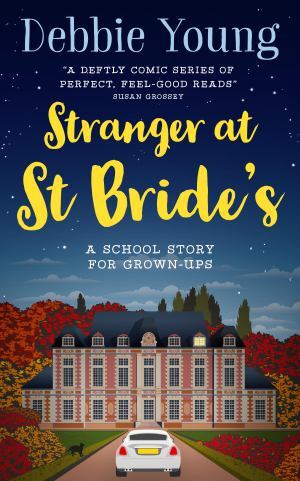
Order Secrets at St Bride’s
Buy the paperback onlineBuy the ebook direct from meBuy from any other ebook retailerBuy from your favourite bookshop: if you can’t find Secrets at St Bride’s at your favourite bookshop, ask them to order it in for you, quoting ISBN 978 1911 223 436Order Stranger at St Bride’s
Buy the ebook onlineBuy the paperback onlineOrder from your local bookshop, quoting ISBN 978-1-911223-597(DID YOU KNOW? Secrets at St Bride’s was shortlisted for The Selfies Award 2020, given to the best independently-published adult fiction in the UK by publishing industry news service Bookbrunch. )
October 14, 2021
Me & My Mini #1: Anita Davison
Introducing a new occasional series of interviews with authors about their Mini cars
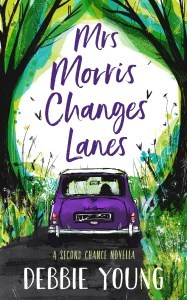 Beautiful cover design by Rachel Lawston of http://www.lawstondesign.com
Beautiful cover design by Rachel Lawston of http://www.lawstondesign.comWhen I started writing my new novella, Mrs Morris Changes Lanes, in which an unusual loan car takes the heroine on a lifechanging journey, the Mini was not my first choice of car for the central character, Juliet Morris.
Originally I’d intended to give her a red Fiat 500, but as I began to describe the sleepy, narrow lanes of the Cotswold countryside in which her journey begins, that car seemed all wrong. I realised a Fiat 500 would be more at home in the teeming, noisy roads of central Rome than on quiet English country lanes lined with ancient hedgerows.
My original reason for choosing the Fiat 500 was that for reasons of the plot, Juliet Morris’s car needed to be a relatively timeless model that had been in production a long time. Was there a more appropriate British equivalent?
Suddenly it came to me: the Mini, even more of a recognisable cultural icon than the Fiat 500. And it would have to be purple rather than red to look more at home among the greens and whites of the Cotswold lanes in spring.
Now, I’ve never owned or even driven a Mini, other than the MG Mini Metro, a 1980s hatchback that had very little in common with the classic Mini or its modern equivalent. But as soon as I started to tell my author friends about Mrs Morris Changes Lanes, many of them went into raptures about Minis they had owned.
I wanted to know more about why they were so passionate about their Mini, and I thought my readers might too, especially if they’d already fallen for Mrs Morris’s Mini.
Reviewers often express their desire for a car like Mrs Morris’s. If you read the novella, you’ll understand that their longing is nothing to do with the car’s classic design.
So without more ado, let’s welcome historical novelist Anita Davison to tell us all about her love affair with the Mini.
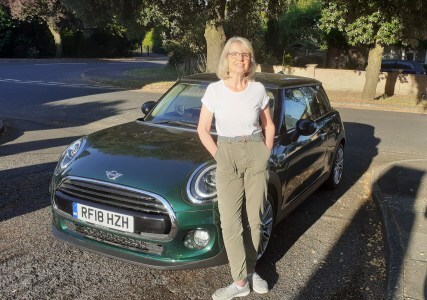 Anita Davison with Ralf, her latest Mini – a world away from the cars driven by the characters in her Flora Maguire historical mystery novels set around the turn of the 20th century
Anita Davison with Ralf, her latest Mini – a world away from the cars driven by the characters in her Flora Maguire historical mystery novels set around the turn of the 20th centuryAnita, why and when did you buy your first Mini?
My first Mini Cooper was a gift from my husband in 2005 so I have no clue how much he paid for it. He asked me to meet him at a specific location at a certain time. I remember being annoyed at the time as I had things to do and it was a half-mile detour from my usual route so when I arrived, I was a bit prickly. I saw my son, daughter and husband all standing in the road looking extremely smug beside a blueberry-coloured 1.4 Mini Cooper with a black interior. It was obviously just out of the showroom. I gave the car a cursory look and was about to demand what they were playing at when they yelled ‘Surprise!!’
How long did you keep it and why did you sell it?
We moved to Surrey about five years later and it seemed the right time to trade it in for another vehicle. To be honest, I don’t recall what replaced it, but it was far less memorable.
Many Mini drivers seemed to feel compelled to name their Minis, as if they have a personality of their own. What was yours called?
Of course he had a personality of his own! He was definitely male – all Minis are male, aren’t they? So I called him Alice, after Alice Cooper.
What did you most love about your Mini?
Alice gripped the road beautifully, was very nippy, and left many more powerful cars for dead at traffic lights. He also had this little squeal in the power steering which always made me smile, like he was talking to me. Parking was a dream too as the square design meant I could see all four corners – this in the era where distance alerts were an expensive extra.
Where did your longest journey in your Mini take you?
Alice was a second, even a third vehicle, so used for mainly short trips – I think I only did about 8k miles in him in two years – so not very far! I did take him into Central London once and can honestly say I was put off completely and never did that again. Not because of Alice, but because of me!
What was your most exciting trip?
The above one into London – and was also the most hairy!
What most surprised you about your Mini?
Driving him made me feel more adventurous. Not reckless, but driving became a bit more exciting, and other Mini drivers would often give way, wave me on and smile as if we were all in a secret club.
Did you ever have any accidents or any scary trips in your Mini?
No, not once, but then I only did short trips to places I knew well.
Who was your favourite/most interesting/most difficult passenger and why?
A writer friend came to London from New York and I went to fetch her from the airport. She was interesting in that it was our first meeting face-to-face. From the second she got into Alice, we chatted all the way home non-stop as if we had known each other for years. Which we had, but virtually. She loved Alice too and asked about her long after she went home to NY.
Was your Mini a one-off buy or did you stay brand loyal and buy more Minis later?
We bought another Mini Cooper two years ago – He is British Racing Green and called Ralf.
What do you miss about your first Mini?
I don’t, as Ralf’s out on the drive anytime I want some fun, but I do think of Alice sometimes.
What would be your dream car if money were no object?
I’m not much of a petrolhead – that’s reserved for the men in my family. Actually, scrap that, my daughter IS a petrolhead! To be honest, if I was in that position I would go for a JCW Mini Cooper S.
What did you think of Mrs Morris’s Mini in Mrs Morris Changes Lanes?
She reminded me of Alice, as physically they were very similar – In fact, I got quite nostalgic. Alice was special.
To what extent do cars feature in your novels?
I certainly do have motor cars in my novels, and I had fun researching them!
Flora’s husband Bunny is an enthusiast, but in the very early 1900’s it wasn’t a lucrative business to become involved in so he became a solicitor. However, motor cars are an integral part of his life.
Flora is taken on a balloon ride by William, and she meets Charles Rolls, the joint founder of the Rolls Royce Company. The company only ran for about four years when Charles was killed in an air accident at a display at the age of 32. His older partner, Henry Royce changed the ‘RR’ emblem from red to black to honour him and it’s stayed that way ever since.
Anita, thank you so much for sharing your passion for your Minis with us, and for your kind permission to quote two extracts from your Flora Maguire Mysteries series below. In the first extract, Bunny’s interest in “horseless carriages” is instrumental in his making Flora’s acquaintance, and in the second, her father shows off his latest acquisition.
 Flora and Bunny first meet on the deck of the SS Minneapolis over the bonnet of his, Panhard-Levassor Landaulet, one of the first motor cars built by a French company in the 1890’s. This was an A1 Model made in 1898
Flora and Bunny first meet on the deck of the SS Minneapolis over the bonnet of his, Panhard-Levassor Landaulet, one of the first motor cars built by a French company in the 1890’s. This was an A1 Model made in 1898Excerpt from FLORA’S SECRET (Flora Maguire Mysteries Book 1)
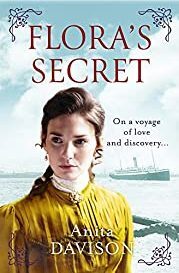 Flora headed for the aft saloon deck, where land was no more than a blur on the horizon beneath the purple and navy of a darkening sky. A gust of cold air lifted the hair at the temples and she shivered, glad of her shawl. She passed a stack of steamer chairs piled beneath the metal companionway, the massive round winches on a deck empty but for a square, bulky shape under canvas, fastened down with thick ropes.
Flora headed for the aft saloon deck, where land was no more than a blur on the horizon beneath the purple and navy of a darkening sky. A gust of cold air lifted the hair at the temples and she shivered, glad of her shawl. She passed a stack of steamer chairs piled beneath the metal companionway, the massive round winches on a deck empty but for a square, bulky shape under canvas, fastened down with thick ropes.
Flora recalled from Eddy’s lecture that the Minneapolis was designed to carry livestock, but sailed in ballast this trip, used to keep the vessel upright and discarded when the ship reached port.
The strange object stood a few inches taller than herself, several feet wide and distinctly square, but with vague shapes protruding from the front; that it was ballast seemed unlikely.
With a swift backwards glance to ensure she was not observed, Flora eased into a gap between the swaddled shape and a stack of fenders piled beside the companionway.
The oiled canvas proved heavier than she imagined, but a brief struggle and a determined tug revealed a rubber wheel more than two inches thick, beneath a curve of black-painted metal. Smaller than a cartwheel, the wooden section was painted in cream with thick spokes picked out in brown; some sort of wheeled cart, but much sturdier.
‘Magnificent, isn’t it?’ a male voice said at her shoulder.
Flora jumped backwards, her head colliding with the metal support, sending a sharp pain through the crown of her head. She raised one hand to her scalp and swung round to where a young man stood, his feet splayed and both hands tucked into the pockets of a dinner suit. His tie lay undone against the lapels of his jacket, the collar open on his throat and his fair hair in disarray from the evening breeze. Penetrating eyes of an indistinguishable colour in the low light behind a pair of rimless spectacles regarded her with unnerving intensity.
And he was laughing.
A reprimand rose to her lips, suppressed when he removed his hand from his pocket and held it out, whether to draw her from beneath the metal support, or to shake hers, she wasn’t sure.
‘I cannot tell,’ Flora snapped, taking small revenge by ignoring his hand. ‘Whatever it might be is still mostly covered by this canvas sheet.’
‘Quite right. And I shouldn’t laugh, not when you might be hurt? I apologize, but I’ve simply never seen someone look so guilty, and yet so angry at the same time.’
‘I’m not hurt, not really.’ Flora rubbed the crown of her head. ‘However, next time, I would appreciate some sort of warning before you creep up on me like that.’
‘Next time?’ His lips twitched. ‘Should I assume you make a habit of skulking round ships in search of treasure then? Because if so, you do know that makes you a pirate?’
‘I beg your pardon?’ Flora tucked in her chin, frowning. Either her throbbing head was making her dizzy, or he was deranged.
‘I’ve never met a pirate,’ he chattered on. ‘But as I always say, life is an adventure.’ He thrust out his hand again. ‘Bunny Harrington, pleased to meet you.’
Gingerly, she accepted his hand, startled at how firm and warm his grip was in hers. Her pulse raced uncomfortably, and, unnerved, she snatched back her hand.
‘Actually it’s a nickname,’ he said in response to her surprised start. ‘My real name is positively unmentionable.’ He guided her from beneath the overhang with one hand, his other at her waist. ‘Do you have a particular interest in motor cars?’
‘Is that what this is? One of those horseless carriages?’ Her thoughts flowed again, though with less clarity than normal, hampered by her throbbing scalp.
‘Indeed, yes. Would you like to see her?’
Before she could answer he had hauled the canvas aside, revealing what resembled a scaled-down hansom cab, but on four wheels as opposed to two, with a fifth wheel on a pole behind a sheet of glass where the driver should be. Instead of traces for a horse, there sat a rectangular metal box with rounded corners.
‘It’s, um – quite impressive.’ Flora stared, fascinated. ‘This is yours?’
‘She is indeed. He ran a hand gently over the fender in a caress. ‘A Panhard-Levassor Landaulet.’
‘They make these in America?’ Flora’s nerves receded and curiosity took its place, though her head still throbbed a little. Following his example, she stroked the caramel paintwork, surprised to find it was smooth as glass beneath her fingers.
‘This particular masterpiece is French.’ He adjusted his glasses by a sidebar. ‘I had her shipped over in the autumn to show to the Duryea Motor Wagon Company.’
‘And it really goes all by itself?’ Flora had seen pictures in the London Illustrated News of motor cars, but she had never seen one.
‘Not exactly.’ His bemused frown made him even more attractive. ‘She’s powered by a front-mounted engine with rear-wheel drive, a sliding-gear transmission—’ His mouth closed with a snap. ‘Well, never mind all that, I’m sure it’s of no interest to you.’ He pushed a hand through his hair, revealing a well-defined brow and arched eyebrows slightly darker than his hair. ‘Besides, I still don’t know your name.’
‘Flora. Flora Maguire,’ she said, disarmed by the intensity of his stare that made her think they had met before, but couldn’t possibly be the case.
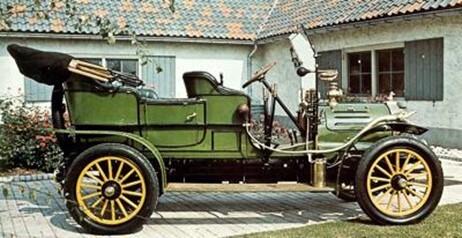 As an affluent solicitor, Bunny graduates to an Astor
As an affluent solicitor, Bunny graduates to an AstorExtract from THE FORGOTTEN CHILDREN (Flora Maguire Mysteries Book 4)
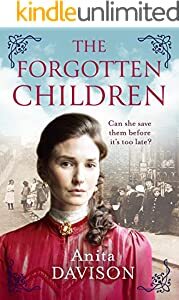 ‘Master Arthur has been dressed and fed, Mrs Harrington, if you wish to visit the nursery.’ Milly, the nursery-maid, her face as expressionless as a mannequin in Selfridges shop window.
‘Master Arthur has been dressed and fed, Mrs Harrington, if you wish to visit the nursery.’ Milly, the nursery-maid, her face as expressionless as a mannequin in Selfridges shop window.
stood in the door frame, her gaze fixed somewhere above Flora’s head.
Didn’t the girl ever smile?
‘Thank you, Milly. I’ll be up in a moment,’ Flora replied, dismissing her.
‘What was that about?’ Bunny scowled as the door closed. ‘You aren’t usually so terse with the servants? Has she done something to annoy you?’
‘I now have arranged set times for my visits.’ At his incredulous look, she shrugged. ‘It’s the only way I ever get to see the baby. She would keep me out of the nursery altogether if she could.’
‘What do you mean?’ Bunny’s brusque tone demanded an explanation. Stokes could have set up a wine shop in the cellar for all Bunny would have noticed, but anything concerning the wellbeing of their son required his full attention.
‘Her manner makes me feel as though our son is like a new toy I’m not allowed to play with. Milly chooses his clothes and decides which toys he plays with and when.’
In Flora’s opinion, Milly was too young to bear the responsibility of their precious new baby, though Bunny had insisted she was well qualified. If only she was more animated; surely babies needed smiles and happiness around them?
‘He’s not yet five months old, darling.’ Bunny chuckled. ‘He doesn’t play with toys yet apart from the soft and fuzzy kind.’ He returned to the table and shuffled his papers into order, apparently having lost interest in the subject.
Flora sighed in frustration. The teddy bear Flora had bought Arthur was always missing from his crib when she visited, replaced by a surprised looking bunny rabbit. Its appearance always made her feel rejected, although the baby could not know the difference.
‘I took him to the park in his perambulator the other day,’ Flora persisted, conscious she sounded petulant. ‘When I got back, Milly told me I had kept him too long in the London air.’
‘Should I discharge her?’ He peered at her over his spectacles, though a smile twitched the corner of his mouth.
‘Er-no, don’t do that.’ The idea had instantly appealed only to be rejected again, replaced by practicality. ‘Good nursery staff aren’t easy to find. Besides, she’s very efficient and even I have to admit Arthur’s thriving.’
‘Then you mustn’t let her bully you.’ He slid the papers into a well-worn leather briefcase that sat on an empty chair.
‘Sally tells me the same thing. She doesn’t like Milly much either.’ Flora’s lady’s maid was a forthright young woman engaged partly because her mother-in-law disapproved. Flora had never regretted her decision, for Sally Pond had proved an asset during an encounter with a murderer the previous year. She couldn’t imagine life without her now, in spite of the girl’s forthrightness.
A discreet knock at the door followed by a cough preceded the return of Stokes.
‘Mr Osborne has arrived, Madam. I’ve shown him into the study to await your convenience.’
‘Thank you, Stokes.’ Flora glanced at the ormolu clock on the mantle as the butler withdrew. ‘He isn’t due for another half hour.’
‘Where is William taking you on this treat which he won’t reveal to anyone?’ Bunny hefted the briefcase in one hand and made for the door.
‘You’ve just answered your own question. He says it’s a surprise.’ Flora moved to the window that overlooked the street. ‘Now I know why he’s early. He’s come to show off his new acquisition.’
Bunny crossed the room in three brisk strides and gave a sharp intake of breath at the sight of a gleaming motor car that stood at the curb. ‘Good grief, it’s a Spyker!’
‘A what?’ Flora blinked at the admiration in Bunny’s eyes which reminded her of an intensity he normally reserved for her, and was now being shared by several passers-by on the street who had gathered round to admire it.
‘I suppose it is quite pretty,’ she said, feeling a need to show some enthusiasm. ‘I like the emerald green colour with the black outlines on the doors.’
‘She’s more than pretty. Beneath that bonnet is an eighteen-horsepower engine, a pressed steel chassis with solid axles and an advanced suspension system of elliptic leaf springs.’
‘Well, of course, that makes it all so much clearer.’ Flora rolled her eyes and reached up to plant a kiss on his cheek. ‘And now I know you’ll be happily occupied with William’s new toy, I can spend a few moments with Arthur before we leave.’
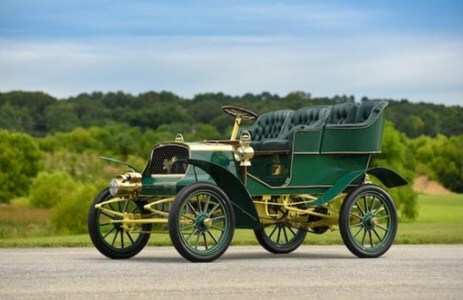 Bunny is impressed when Flora’s father turns up in a Dutch-built SprykerFOR MORE INFORMATION ABOUT ANITA DAVISON
Bunny is impressed when Flora’s father turns up in a Dutch-built SprykerFOR MORE INFORMATION ABOUT ANITA DAVISON To join Flora at the start of her adventures aboard the SS Mesopotamia, read Flora’s Secret
To join Flora at the start of her adventures aboard the SS Mesopotamia, read Flora’s SecretVisit her website: www.anitadavison.co.uk.
The five Flora Maguire Mystery novels, published by Aria Fiction, are available in ebook and paperback:
Flora’s Secret
Betrayal at Cleeve Abbey
A Knightsbridge Scandal
The Forgotten Children
The Bloomsbury Affair
FOR MORE INFORMATION ABOUT MRS MORRIS CHANGES LANES
Click the link below to find out more about Mrs Morris Changes Lanes and to order your copy in ebook or paperback:
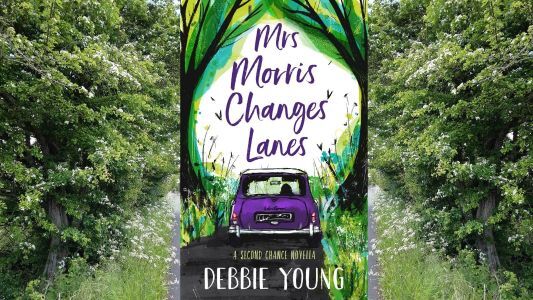
October 6, 2021
Glad to be Grey
It may seem perverse to begin my column this month by celebrating a shade that is absent from colourful autumnal trees and hedgerows, apart from in the glittering spiders’ webs suddenly all over our gardens.
Instead I want to talk about a colour – some might call it a non-colour – that since the start of the first lockdown has been top of mind for me, and increasingly on top of my head.
You see, for those of us of a certain age, grey is the new brunette. BC (Before Covid), every four or five weeks, I would happily pop into Hawkesbury’s hairdressing salon, Head Start Studio, for a cut and colour to keep my grey roots hidden and my ends from splitting.
This regular dose of me-time meant I genuinely had no idea what percentage of my hair would be grey if left untouched by hairdresser’s hand. Under lockdown, with the decision to dye or not to dye denied me, the truth slowly emerged.
To my surprise, growing out my grey felt strangely liberating. Ever the Pollyanna, I decided to embrace my inadvertent inverted ombre.
With the irritating zeal of a reformed smoker, I developed a radar for people who had given up their dye-jobs, kindred spirits who had also ushered in the ashen look.
By contrast, I was interested to see who swung in the opposite direction, colouring their hair ever brighter with purples, blues and pinks. I hope this trend helped compensate colourant manufacturers who had lost customers like me.
 My inadvertent inverted ombre (now there’s a tongue-twister!)
My inadvertent inverted ombre (now there’s a tongue-twister!)A kind friend on the same path introduced me to purple shampoo. Rather than colouring your hair mauve, it promises to transform plain grey into shining silver. This counterintuitive trick reminds me of the blue bag my grandmother used in her twin tub to wash whites whiter. I didn’t understand how that worked, either, but it did.
Now I’m wondering why it took me so long to realise I should be glad to be grey. It’s a softer, more flattering look for older skin, as well as a saver of time, money and effort. My only dilemma is how to continue to support Head Start Studio while keeping my new-found natural colour. I’ve always said I go there as much for the entertainment value as for the hairdressing, always leaving with my face aching from laughing so much at Tasha and Alannah’s banter.
Then the answer came to me: I can still visit just as often, if I ask them each time to cut only half as much off as they used to.
This post was originally written for the October issue of the Hawkesbury Parish News.
September 29, 2021
Travels with my Books #9: With Helena Halme to the Aland Islands in the Baltic Sea
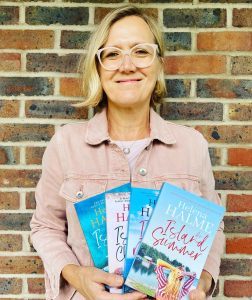 Meet Helena Halme, Finnish author
Meet Helena Halme, Finnish authorI’m delighted to welcome my Finnish author friend, Helena Halme, who although now living in London and married to “The Englishman” who inspired a series of novels, is here to talk to us about her Love on the Island series, set on the Åland Islands, situated in the middle of the Baltic Sea between Finland and Sweden.
This fast-growing series of romantic novels plunges us into Åland Island life, and so far four titles are available, with the fifth due out later this year.
The Island Affair (Book 1)
An Island Christmas (Book 2)
The Island Daughter (Book 3)
An Island Summer (Book 4)
The Island Child (Book 5)
Over to Helena to tell us more about them…
 All the books follow Alicia, whose teenage son, Stefan, dies in a motorcycle accident in London. After her marriage breaks up with the British surgeon Liam, returns to her native islands and has a passionate affair with the Swedish journalist Patrick.
All the books follow Alicia, whose teenage son, Stefan, dies in a motorcycle accident in London. After her marriage breaks up with the British surgeon Liam, returns to her native islands and has a passionate affair with the Swedish journalist Patrick.
Alicia’s tumultuous relationship with both Patrick and Liam spans the series. We also meet Alicia’s mom, Hilda, her best friend Brit, and her late son’s girlfriend Frida. The four women’s relationships face difficulties as babies are born and elderly parents die. There are long-held family secrets, newly found love, as well dark mysteries on the islands which threaten to destroy both Alicia, her family, and friends.
Helena, what makes the Åland Islands such a great setting for your stories?
Islands have always fascinated me, mainly because they are such contained places, both physically and culturally.
There are no bridges between the mainland and the Åland Islands, so you have to either travel by sea or fly in order to reach the islands. They are also a huge tourist spot, with a small population tripling during the summer months. On top of all that, the islands lie closer to Sweden but are an autonomous part of Finland, where the official language is Swedish.
Is it any wonder that the islanders are very independent and don’t consider themselves either Swedish or Finnish.
There are all kinds of special rules attached to the islands. For example, you cannot own land unless you are a resident and you have to be able to speak Swedish to gain residency, which is a sore point to many Finns.
The islands are a tax-free zone, which increases tourism but also encourages cruise liners to make briefest of stops to the islands when the passengers never even have time to set one foot on land.
All this make the islanders quite insular and quirky. Perfect for a novelist!
 Typical view of houses, sheds and boats on Aland islands
Typical view of houses, sheds and boats on Aland islandsWhat is your relationship with Åland Islands and how much of your life have you spent there?
I have a very personal reason why I set my books on the Åland Islands. For the past thirty years, my mother has been living on the islands (she’s married to a local farmer) and I’ve become ‘a summer islander’ as the locals call me.
I’ve wanted to set a story on the islands for a long time, but it wasn’t until I dreamt up the characters that I was able to do it. Alicia, especially, didn’t really come to me until I had explored many kinds of stories set in Åland.
In my imagination, there was always a locally brought up woman returning to the islands from the UK, because this is something I myself dreamt of doing. (I didn’t want to leave my Englishman, though, so it never happened!)
When I discovered Alicia and the tragic story of the loss of a son, I knew I had an idea for a series. I don’t know any mother who doesn’t constantly fear that something like that happens to their children. Wouldn’t you want to go home where you felt safe in such an awful circumstance? And wouldn’t your marriage suffer? Especially if you blame your husband for the accident as Alicia does?
What challenges do your characters from beyond the island face dealing with the local people?
The person most at odds with the local islanders is Alicia’s ex, Liam. While their son was alive, the family would spend a couple of weeks each summer on the islands, which Liam resented.
Firstly, he didn’t like the food. There’s so much heavy rye bread and other stodgy, strange dishes. And who eats raw herring?
He hated the daily ritual of the sauna. It’s too hot and, he’s certain, bad for your heart. He never learned the language, although the island folk don’t speak much in general, preferring silence to small talk. Which Liam also found odd, and, frankly, rude. On top of everything, Liam gets seasick and hates flying, the only two ways you can reach the islands.
What are your top tips for any readers planning to travel to the Åland Islands?
Definitely do arrive by sea, either via Finland or Sweden. The archipelago is stunning any time of the year.
The summer is the best season to visit. During any other time of the year, the islands and their residents go into a kind of hibernation.
My children used to say that during the last week of our holiday in August when the schools had already started on the mainland, there was tumbleweed rolling along the main shopping street of Mariehamn, the capital of the islands.
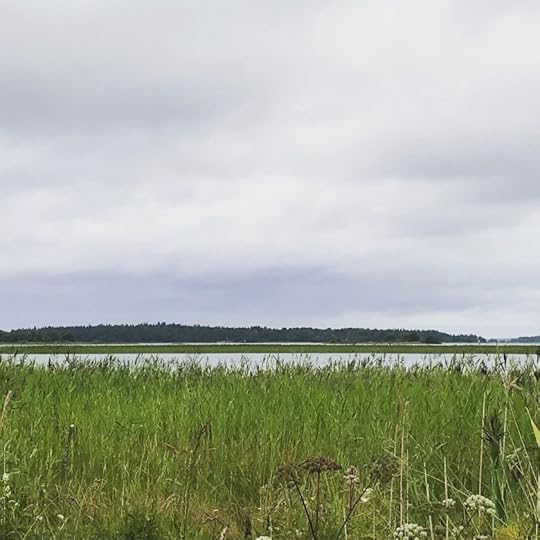
Another top tip is to eat as much of the local food as possible. Liam is wrong: it’s all fresh and lovely and delicious. Try the local speciality, a clafoutis-like oven-baked pancake, Ålandspannkaka. It’s served with local plum preserve and whipped cream. Washed down with a cup of strong coffee, naturally. Unmissable!
Where will your next book be set?
 The next book in the series, The Island Child, is again set on the Åland Islands. The story centres around Brit, Alicia’s best friend who after travelling the world has settled on the islands with a local sea captain, Jukka. But her past comes knocking with an unpleasant character bringing a nasty surprise to the heavily pregnant Brit. To complicate things, just as Brit is about to give birth, Jukka’s ship runs aground outside Mariehamn. With Alicia’s mother Hilda onboard…
The next book in the series, The Island Child, is again set on the Åland Islands. The story centres around Brit, Alicia’s best friend who after travelling the world has settled on the islands with a local sea captain, Jukka. But her past comes knocking with an unpleasant character bringing a nasty surprise to the heavily pregnant Brit. To complicate things, just as Brit is about to give birth, Jukka’s ship runs aground outside Mariehamn. With Alicia’s mother Hilda onboard…
The story will also touch on Alicia’s continuing love triangle with her Swedish lover Patrick and her ex-husband, Liam. Alicia’s mother Hilda also has a new love interest!
The Island Child will be out before Christmas, but is now on pre-order.
EXTRACT from An Island Christmas
This is a short excerpt from the second book in the Love on the Island series, An Island Christmas. It’s a scene set on Christmas Eve, the main day of celebrations on the islands. It’s Alicia’s first Christmas back and she wants the day to be perfect, but her plans are disrupted by the unwelcome arrival of someone she’s decided to forget …
Patrick turns into the Ulsson’s drive and parks the car next to a VW Golf. He turns off his lights and stays in the car for a moment. On the passenger seat is a paper bag filled with Christmas presents wrapped up expertly by one of the assistants at the fashionable interior design shop in town. They are beautifully understated, in white paper with wide red ribbons.
There’s also the large box containing a magnum of vintage champagne resting on the floor of the car. He wonders if that is overkill. Should he perhaps leave the bottle behind and fetch it later, if he gets a good reception from Alicia?
He gazes up to the house, shining brightly in the dark afternoon light, the downstairs windows decorated with large star lanterns. The freshly fallen snow has formed a blanket over the sloping roof and the landscape. With the large pine draped with white lights, the whole scene looks serene and festive, like a TV advert.
Damn it, be brave.
Hilda will appreciate the champagne, he’s sure, so he picks up the box, takes hold of the paper bag, slams the door of his car, and makes his way up to the house.
‘Who’s that?’ Hilda asks.
Alicia cannot believe her eyes. She watches as Patrick gets out of the car, picking something up from the passenger seat. She has her phone against her ear, still talking to Frida. The baby is crying in the background.
‘Can I ring you later?’ Alicia says and ends the call.
‘Is that who I think it is?’ Hilda says, her mouth open, forming an ‘o.’
‘What the hell does he think he’s doing?’ Alicia says and hurries to the door.
But Patrick is quicker than she is, and by the time she opens the door, he is already standing there, a wide grin filling his face. He’s carrying a bag full of presents and a large box.
‘Surprise!’ he says.
Alicia stands there, dumbfounded. She cannot speak.
‘Can I come in?’ Patrick asks. ‘It’s bloody cold out here.’
‘Patrick, what a lovely surprise!’ Hilda says. She’s standing behind Alicia, who’s unable to move or speak. At her mother’s words, she turns to scowl at Hilda. She widens her eyes at her daughter. ‘Come now, let the poor man in. He must be freezing.’
Patrick smiles at Hilda and steps past Alicia, who is still holding onto the door handle. Alicia gets a waft of his perfume and the smell of the crisp outside. She tries not to let his rousing presence affect her judgment.
What is he playing at? He must know Liam is here?
‘Alicia, close that door before we all catch our death,’ Hilda says.
‘God Jul!’
Patrick hugs Hilda. He hands her the box he’s holding and when she sees what it is, she exclaims, ‘Oh, my goodness. Thank you and Merry Christmas to you too!’
‘I’m sorry I’ve come unannounced, but I thought I’d drop my presents off. I didn’t get a chance to do it before today, but I won’t keep you.’
With that, he turns around and hands her the bag of presents.
‘Happy Christmas, Alicia.’ His voice is soft and he bends down to give her a kiss on the cheek while grabbing the door handle, ready to go back outside.
‘Patrick, you can’t leave without at least having a drink with us!’ Hilda exclaims.
‘I couldn’t possibly, it’s a family occasion,’ Patrick says.
Alicia rolls her eyes at him, but he either doesn’t see her or ignores her on purpose and, smiling at Hilda, continues, ‘If you’re sure?’
FOR MORE INFORMATION ABOUT HELENA HALMEVisit her website https://helenahalme.com/ and follow her lively Instagram account at www.instagram.com/helenahalme.
ANOTHER ISLAND STORY
If, like Helena Halme (and Agatha Christie!), you love stories set on islands, you can also take a trip to Ithace, Greece in the company of Sophie Sayers in my sixth novel about her, Murder Your Darlings.
 Shortlisted for the Selfies Award 2021, given to the best independently-published adult novels in the UKOrder the paperback from Amazon or from your local bookshop by quoting ISBN 978-1-911223-55-9Order ebook online (available for all ereaders and ereading apps)
Shortlisted for the Selfies Award 2021, given to the best independently-published adult novels in the UKOrder the paperback from Amazon or from your local bookshop by quoting ISBN 978-1-911223-55-9Order ebook online (available for all ereaders and ereading apps)PREVIOUS POSTS IN THIS SERIES:
To Fiji with B M AllsoppTo the Caribbean with Helen HollickTo Europe and Roma Nova with Alison MortonTo Egypt with Carol CooperTo The Fair Land with Lucienne BoyceAround the world with Clare FlynnTo Italy with Jean BurnettTo Salzburg, Austria with JJ Marsh
September 22, 2021
The Wasp and Goliath
Thanks to the copious sunshine and rain this summer, our annual glut of tree fruit arrives early in our garden. Soon we’re in a race against time to pick up the windfalls before they start to rot.
One afternoon in August, I’m so intent on my task beneath a plum tree that I don’t notice a wasp lurking in the grass until I have knelt on it and it has stung me. Pesky wasps, I think, retreating indoors to treat my throbbing knee.
Remembering my grandmother’s mantra, “Bicarbonate for bees and winegar for wasps”, I head for the larder.
Only after applying a splash of Sarson’s does it occur to me that medical knowledge has moved on since my grandmother’s day, so I grab my phone to search for more modern remedies. Before I can raid the bathroom cabinet for the recommended antihistamine tablets and cream, I fall down a Google rabbit-hole, looking up the difference between wasps and bees.
What’s the Use of Wasps?I’m wondering why we feel so contemptuous for wasps, when spotting bees in the garden feels like a celebration. Both can sting us. Is it only because wasps don’t make honey or beeswax that we can divert for human use?
If so, that’s a short-sighted attitude, because it turns out wasps have a very important role in nature. The BBC website tells me:
wasps kill pests that prey on cropswasps are the farmer’s friend and the gardener’s ally, protecting our produce and helping us to maintain yieldsthey also eat insects that spread human diseaseHow very helpful of them.
Lyn’s LadybirdsI knew ladybirds eat greenfly, because my late friend Lyn, an early proponent of organic gardening, used to collect ladybirds in matchboxes and release them into her greenhouse in place of chemical insecticides.
Apparently, wasps are sometimes used the same way in agriculture, presumably without the matchboxes.
For a moment I picture swarms of wasps stinging predatory pests to death like a miniature militarised attack force, leaving a battlefield full of tiny dead bodies in their wake. Then I discover wasps eat their victims or take them home for their young. Unlike bees, they are carnivorous. Wasps are also the evolutionary forerunner to bees.
The Jobsworth Wasp“Bees are wasps who have forgotten how to hunt,” says Professor Seirian Sumner of University Collect London. Bees have had other things on their minds, such as developing wax-making glands that wasps lack. (See this Guardian article for more details.)
Thus the wasp that stung my knee was only doing its job of protecting the plum crop. To the wasp, I was a giant crop-destroying predator, and its duty was to repel me. Like David’s slingshot and stone that felled Goliath, the wasp’s sting was highly effective: I instantly fled the scene and left the plums alone.
In future I’ll be more respectful of this tiny breed of busybodies and let them get on with their pest patrol.
After all, there are plenty of plums for us all.
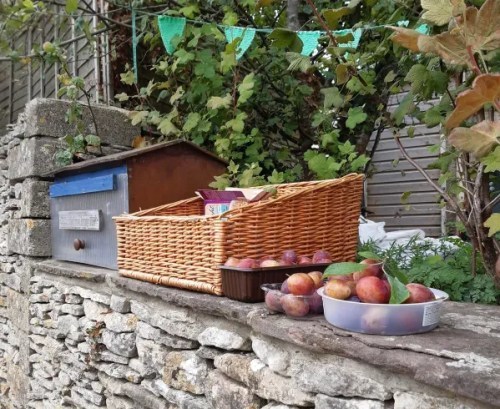 A permanent feature on my front wall during this year’s plum season: free plums for passers-by. The reason there is a catfood box in the basket is because by this point we had run out of punnets to put plums in and were having to improvise with any container that came to hand.
A permanent feature on my front wall during this year’s plum season: free plums for passers-by. The reason there is a catfood box in the basket is because by this point we had run out of punnets to put plums in and were having to improvise with any container that came to hand.
This article was originally written for the September issue of the Tetbury Advertiser,
holder of the Queen’s Award for Voluntary Service
TO READ MORE ARTICLES LIKE THIS
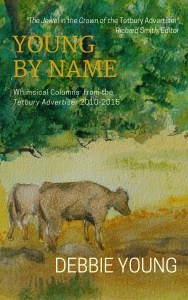 The first volume covered 2010-2015.
The first volume covered 2010-2015.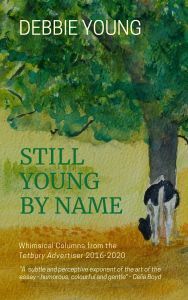 The second volume includes 2016-2020
The second volume includes 2016-2020If you enjoy reading my columns from the Tetbury Advertiser, you might like to know that I’ve published two collections of them, now available in ebook and paperback. The cover images are details from my father’s watercolour painting of a Cotswold field.
Order the ebooks here:
Order the paperbacks here:
Or ask your local bookshop to order your copy in-store.
September 17, 2021
Lane Discipline: the Inspiration for my New Novella
 Cover design by Rachel Lawston inspired by the single-track roads of the Cotswolds in spring
Cover design by Rachel Lawston inspired by the single-track roads of the Cotswolds in springWhen I first moved to Hawkesbury Upton, I didn’t realise that three of the four roads into the village were partly single track with passing places. Learning to drive in suburban London, my lessons had been exclusively in built-up areas. In my company car, I was clocking up most of my miles on motorways. Negotiating rural lanes required a recalibration of my driving skills.
However, I soon learned to love the local lanes all year round, enjoying seeing the seasons change in the hedgerows and verges – from snowdrops to primroses, from wild garlic to cow parsley.
A few months after moving to the village, with the smugness of the newly-converted, I laughed at a visiting townie friend perplexed by the etiquette of country driving. “Do you really know everybody round here?” he asked, having seen me exchange the usual waves of thanks with drivers who pulled over for me, or to whom I gave way.
When another driver refused to give way despite being closer to a passing place than we were, my friend was about to express his feelings in the international sign language of the angry motorist. “Best not to do that so close to home,” I advised, “as actually it is quite likely that I will know the other driver.”
He said that if he had to live in my house, he’d never leave the village at the wheel of a car.
Three decades later, meeting traffic on single-track roads doesn’t bother me, but I do prefer to have the lanes to myself, not for road rage reasons, but because when they’re deserted, there’s something other-worldly about them.
Not always in a good way: on dark, moonless nights without the familiar markers of urban streets – no streetlights or road signs, no road markings or kerbs – the lanes can be disorienting. Add thick fog, snow or torrential rain, and it can feel as if you’re heading for a Hammer Horror film set, where the undead are waiting to greet you.
But in the right light and weather, these narrow lanes can feel perfectly magical.
 Earlier this year, a pleasant drive in the spring sunshine with cow parsley brushing the sides of my car gave me the idea for my new novella, Mrs Morris Changes Lanes, in which a rural journey transforms the heroine’s life by taking her to a surprising destination – and I don’t mean Chipping Sodbury Waitrose.
Earlier this year, a pleasant drive in the spring sunshine with cow parsley brushing the sides of my car gave me the idea for my new novella, Mrs Morris Changes Lanes, in which a rural journey transforms the heroine’s life by taking her to a surprising destination – and I don’t mean Chipping Sodbury Waitrose.
Click here to find out more about Mrs Morris’s Cotswold adventure.
For More Information & to Order
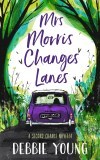
Click here to order the ebook online
Click here to order paperback online
Order from your local bookshop quoting ISBN 978-1911223818
Email me to buy a copy direct from me
This post originally appeared in the September 2021 edition of the Hawkesbury Parish News
September 8, 2021
Travels with my Books #8: With JJ Marsh to Salzburg, Austria
 Meet JJ Marsh, author of psychological thrillers and crime novels
Meet JJ Marsh, author of psychological thrillers and crime novelsToday I’m delighted to welcome JJ Marsh to whisk us away to Salzburg, Austria, the setting of her new psychological thriller, Wolf Tones. I’ve never been there, but it’s a city I feel I know at least a little, thanks to watching The Sound of Music multiple times. Of course, Salzburg is also the birthplace of Mozart, and it’s the city’s classical music tradition, rather than the exploits of the Von Trapp Family Singers, that permeate Wolf Tones, and I enjoyed its portrait of how orchestras and professional musicians live and work, as well as the gripping plot. Over to JJ Marsh to tell us more!
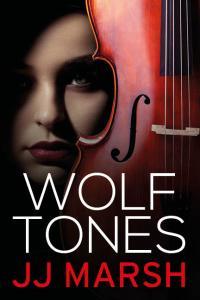 First, please tell us a little more about Wolf Tones and why you set it in Salzburg.
First, please tell us a little more about Wolf Tones and why you set it in Salzburg.
Wolf Tones is a psychological thriller set in the world of classical music. The Austrian city of Salzburg is the perfect backdrop to my story of dark truths behind an austere facade.
What makes this place such a great setting for thisstory?
Music is everywhere in Salzburg; in churches, in parks, in concert halls and in the street. The legacy of Wolfgang Amadeus Mozart is inescapable: his birthplace, house, statues and of course, his music are defining features of this city.
It’s also extraordinarily beautiful, with a hilltop castle overlooking the city and the Salzach river flowing past Baroque buildings. In fact, the Altstadt (Old Town) is a UNESCO World Heritage site. It’s formal and organised and on the surface, well behaved.
I wanted my character to be thrown into a stiff and very proper environment, both in terms of the orchestra and his surroundings, where he struggles to adapt and learn who to trust.
 (Photo by Sebastian Mittermeier via Unsplash.com)
(Photo by Sebastian Mittermeier via Unsplash.com)What is your relationship with Salzburg and how much of your life have you spent there?
Usually I make a point of visiting my locations to ensure authenticity, if only for a weekend mini-break. But I wrote this book in 2020/21, slap-bang in the middle of the pandemic, when travel to other countries was out of the question. So I was dependent on research, friends’ experiences and picking Austrians’ brains.
That said, I live in Zürich. Switzerland has a great deal in common with its next-door neighbour. Café culture, the language, architecture, food and the alpine countryside create a similar atmosphere. My very first trip in two years will be to Salzburg.
 (Photo by Reiseuhu via Unsplash.com)
(Photo by Reiseuhu via Unsplash.com)Your protagonist comes from elsewhere – what challenges does he face dealing with the local people of Salzburg?
Rolf, the main character, comes from Bratislava in Slovakia. Many Slovaks speak German or English as a second language, but Rolf has some gaps in his education so finds navigating daily life using German and speaking English in the multi-national orchestra a huge challenge.
What are the distinguishing features of Salzburg in terms of geography, geology, flora, fauna or any other detail you care to mention?!
Probably the best known fact about the city is its role in The Sound of Music. All the iconic locations in the film are in and around Salzburg: Maria’s convent where the Nonnberg nuns still sing Gregorian choral music at 06.45 every day; the Mirabell gardens and fountains seen when the children learn Do-Re-Mi; the Felsenreitschule, where the von Trapp family perform their patriotic songs just before fleeing from the Nazis to Switzerland.
 (Photo by Kateryna-jw via Unsplash.com)
(Photo by Kateryna-jw via Unsplash.com)As for flora, obviously Edelweiss. These woolly white flowers are rare and only grow on the mountains above 2000 metres. Austrians and Swiss both claim it as their national flower.
You can take walking, cycling and bus tours to visit all the movie landmarks, but your companions will probably be British and American tourists. In the German-speaking world, the film is largely unknown.
What are your top tips for any readers planning to travel to the setting of your book?
Eat cake! Flaky apple strudel, refined chocolate Sachertorte, the fabulous marbled Gugelhupf or shiny groovy Rehruecken, accompanied by a cup of classic Austrian coffee.
Where is your latest book set?
Rio Negro, in the heart of the Amazon rainforest. Black River is the second in my Run and Hide series, out October 2021.
Where will your next book be set?
Macau, on the Pearl River Delta between Hong Kong and China. I just hope they make decent cakes…
EXTRACT FROM WOLF TONES by J J Marsh They spent Sunday morning arranging their new apartment to Leonor’s liking, ate a simple lunch of tinned goulash and walked out to enjoy the sunshine. Hand-in-hand, they strolled the streets, delighting in the blossoms and civic floral displays. Salzburg, in his mind, was clean and white. But his one and only visit had been in the wintry days of February. Now it was a riot of colour with green buds and grassy parks and flowers everywhere. The wide, muddy Salzach River flowed through the city, much like the Danube through the Slovakian capital, lending a sense of openness and light. Rolf had left Bratislava to come to Salzburg, but the river was headed in the opposite direction. The water rushing past his feet would continue its journey to the Danube, past his home town and eventually into the Black Sea.
They spent Sunday morning arranging their new apartment to Leonor’s liking, ate a simple lunch of tinned goulash and walked out to enjoy the sunshine. Hand-in-hand, they strolled the streets, delighting in the blossoms and civic floral displays. Salzburg, in his mind, was clean and white. But his one and only visit had been in the wintry days of February. Now it was a riot of colour with green buds and grassy parks and flowers everywhere. The wide, muddy Salzach River flowed through the city, much like the Danube through the Slovakian capital, lending a sense of openness and light. Rolf had left Bratislava to come to Salzburg, but the river was headed in the opposite direction. The water rushing past his feet would continue its journey to the Danube, past his home town and eventually into the Black Sea.
Selfies against the backdrop of the castle, a coffee and pastry, the obligatory visit to Mozart’s birthplace and a pause to listen to a string quartet in one of the many beautiful squares. It was almost too much to take in, although as far as the quartet was concerned, he had some doubts about the second violinist’s fingering technique. Street performers puzzled him. The casual interest of passers-by was nothing like the breathless attention of a concert hall audience. Rolf was relieved he’d never have to play in the street like a busker. Fine for these music students, of course. It was a way to cut their teeth, but not appropriate for a professional.
Read the first chapter on JJ Marsh’s website here: https://www.jjmarshauthor.com/wolf-tones/
FOR MORE INFORMATION ABOUT JJ MARSHVisit her website: jjmarshauthor.com
PREVIOUS POSTS IN THIS SERIES:
To Fiji with B M AllsoppTo the Caribbean with Helen HollickTo Europe and Roma Nova with Alison MortonTo Egypt with Carol CooperTo The Fair Land with Lucienne BoyceAround the world with Clare FlynnTo Italy with Jean BurnettOr take a trip to the Cotswolds any time, through the pages of my own fiction books.
August 13, 2021
Front Page News on The Bookseller
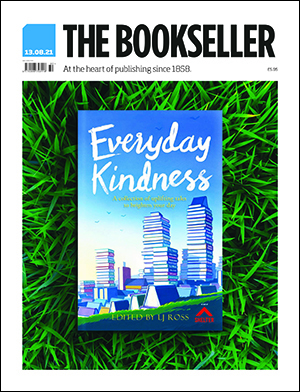 Each of the 50 contributors has their name on the spine of one of the books on the cover – mine is in the pile on the right.
Each of the 50 contributors has their name on the spine of one of the books on the cover – mine is in the pile on the right.I’m very excited today to see my name (in very small print!) on the front cover of the latest issue of the British book trade magazine The Bookseller.
The reason? I’m one of 50 contributors to a wonderful charity anthology, Everyday Kindness, edited by L J Ross, bestselling crime writer of the DCI Ryan mystery series. All proceeds will be donated to Shelter, the British charity for the homeless and those in poor housing.
The names of each of the 50 contributing authors are on the spines of the books in the cover image, a painting donated by the artist Andrew Davidson.
I’m honoured that Louise (LJ) loved the story I submitted and chose to include it in the anthology.
The story is a spin-off from my Sophie Sayers Village Mysteries. In Christmas Ginger, Sophie’s Great Auntie May anticipates spending Christmas alone. (Spoiler alert: as in all my stories, a happy ending is guaranteed, and I submitted this story because it includes a life-changing random act of kindness.)
As well as being an international bestselling author, LJ Ross is a very active philanthropist especially in the north-east of England, where her many novels are set. Find out more about her philanthropy on her website here),
Everyday Kindness will be launched on World Kindness Day (13th November 2021) and will be available for pre-order in October.
Much as I hate to mention Christmas in August, I do think this book would make a great Christmas present! I’ll share details of how to order your copy as soon as I have them.




